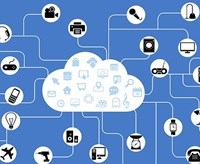
Top stories





Marketing & MediaWarner Bros. was “nice to have” but not at any price, says Netflix
Karabo Ledwaba 1 day

More news

Logistics & Transport
Maersk reroutes sailings around Africa amid Red Sea constraints
















Five sectors in particular are ripe for transformation by the IoT:

Many companies have already installed M2M technology into the machines that dispense their products. This technology increases stock control, ensuring that products that run out are replaced immediately and that products that spend too much time in the machine are replaced timeously.
It also returns invaluable information on consumer patterns, such as which products are most popular during certain times of the day and whether the optimum temperature is being maintained in the machine.
Dacom is an agribusiness support company that produces specialised hardware, software and online advisory services to help farmers increase their yields. These solutions rely on the M2M connectivity services provided by Orange Business Services and allow farmers to monitor their crops like never before, through accurate measurements of insect monitoring, weather and soil moisture among others. This enables powerful control over production throughout the growing season.
Farmers are able to change the settings on these monitoring systems to suit their particular needs and are informed immediately when action is required to protect their crops. Other applications such as Silent Herdsman and Moo Monitor track cows' ovulation cycles to ensure that they are inseminated at exactly the right moment to produce as much milk as possible.
In addition to helping farmers increase their yields, interconnectivity also assists in reducing water wastage and overuse of pesticides, which increases profitability while simultaneously benefiting the environment.
Municipalities, authorities and corporate clients all benefit from smart city technology. Maintenance of city infrastructure, currently the biggest challenge to municipalities, will run much smoother through the automatic monitoring of all amenities, including traffic lights, irrigation, sewage, utilities, lighting, and car parks to name a few.
Such a technologically advanced city is not the preserve of the developed world, as Orange Business Services proved through its implementation of a connected fleet management, public emergency calling tools, and surveillance system in India. This is one of many smart city solutions the business is involved in across the world.
Johannesburg mayor Parks Tau recently announced steps to turn Johannesburg into a smart city during his State of the City Address. Free Wi-Fi will be rolled out across Braamfontein and there will be a drive towards greater uptake of smart electricity meters that could assist in avoiding load shedding through load limiting.
Cars that drive themselves in busy traffic are closer than you think, and even drivers of lower-range cars can look forward to semi-autonomous cars thanks to interconnectivity. Fort businesses, this will unlock positive possibilities in terms of fleet management. Already, many companies use GPS to analyse driving styles, reduce costs and track fuel consumption, and the latest technology includes maintenance and mechanical alerts. Traffic monitoring systems also extend to monitoring entire traffic patterns on roads, making analysis of road conditions and average speeds. Sudden, unexpected congestion often indicates an accident, allowing emergency services to be dispatched that much sooner.
A number of smart traffic interventions are underway in South Africa. These include universal ticketing systems that allow ease of use of public transport and help local governments understand the travel patterns of citizens. Using technology to ease public transport will eventually lead to greater use of public transport, which can assist green initiatives, as municipalities can choose to power their fleets on locally produced bio fuels, for instance.
Smart transport interventions that lower costs are vital to South Africa, where spatial planning legacies have placed the poorest members of society far from work, meaning that they spend a disproportionate percentage of their salaries on travel.
Looming water crises have been forecast for many parts of the world for some time. Smart technology allows better resource management through smart management of both water and electricity.
Systems such as these do not only promise to reduce wastage, but also return valuable information on the consumption patterns of users, allowing providers to tailor their plans to address these patterns, advise on areas, possible theft or detecting power outages quicker.
The City of Tshwane is currently implementing smart city interventions that provides residents with an interface unit to track their consumption in real time. Residents are therefore able to match their current balances against their current usage. This allows them to assess which appliances are using the most energy, which leads to improved consumption patterns.